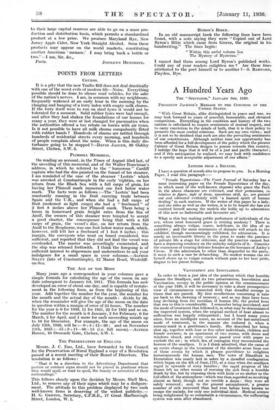A Hundred Years Ago
THE " SPECTATOR," JANUARY 9TH, 1830.
PRESIDENT JACKSON'S MESSAGE TO THE CONGRESS OF THE UNITED STATES.
" With Great Britain, alike distinguished in peace and war, we may look forward to years of peaceful, honourable, and elevated competition. Everything in the condition and history of the two nations is calculated to inspire sentiments of mutual respect, and to carry conviction to the minds of both, that it is their policy to preserve the most cordial relations. Such are my own views; and it is not to be doubted that such are also the prevailing sentiments of our constituents. Although neither time nor opportunity has been afforded for a full development of the policy which the present Cabinet of Great Britain designs to pursue towards this country, I indulge the hope that it will be of a just and pacific character ; and if this anticipation be realized, we may look with confidence to a speedy and acceptable adjustment of our affairs."
LETTERS FROM A RECLUSE.
I have a question of morals also to propose to you. In a Morning Paper, I read this paragraph :- " Female Equestrians—The Court Journal of Saturday has a most interesting paper on the Female Equestrians of the day, in which most of the well-known elegantee who grace the Park in the above character are criticised, and their pretensions, in relation to figure, style of dress, equestrian skill, &c. are pointed out and estimated evidently with ' a learned spirit of human dealing ' in such matters. If the writer of this paper be a lady, and she -rides as well as she writes, it is to be hoped she • has not omitted herself among the models she holds up to admiration of this now so fashionable and favourite art."
What is this but making public performers of individuals of the sex, whose most honoured grace is retiring modesty ? There is something always vulgar, coarse, indelicate, in the idea of an exhibiter ; and the same sentiments of distaste will attach to the exhibited, though unconsentingly exhibited, for admiration. It is surely an inexcusable liberty in the press to make the province of private life a stage for criticism, and the practice cannot but have a depraving tendency on the unlucky subjects of it. Conceive the coarseness of treating delicate females as the heroines of Astley's Circus. If the admiration be other than disgustful to the party, it must in such a case be debauching. No modest woman can see herself shown up to vulgar remark without pain to her best pride, disgust to her purest feelings.
VACCINATION AND INOCULATION.
In order to form a just idea of the position which that horrible disease the Smallpox, and its two preservatives, Inoculation and Vaccination, occupy in the public opinion at the commencement of the year 1830, it will be necessary to take a short retrospective view of circumstances connected with that dreadful scourge in times that are passed. My first recollections concerning it take me back to the dawning of memory ; and as my days have been long declining from the meridian of human life, the period from that acre to this is considerable. I remember being inoculated, and the mode of treatment that followed it, in what may be denominated the improved system, when the original method of heat almost to suffocation was happily relinquished ; but I heard many years since, from an intelligent nurse, an account of the last-mentioned mode of treatment, in the manner she endured it, when a nursery-maid in a gentleman's family. She described her being shut up, together with four or five other individuals, children and female servants, in an apartment of two rooms, with doors and windows closed, and every crevice pasted over with paper to exclude the air ; in which den of contagion they encountered the horrors of the smallpox. It is I think admitted, that the cause of an entire change in the treatment of the disorder arose from one of those events by which it pleases providence to enlighten instantaneously the human race. The town of Blandford in Dorsetshire was nearly laid in ashes by a dreadful conflagration which began on the 4th of June, 1731, at a time when the smallpox raged in upwards of sixty families ; the rapid progress of the flames left no other means of rescuing the sick from a horrible death by fire, but by exposing them with little or no shelter to the full effect of the atmosphere—which was then regarded as involving almost as fatal, though not so terrible a doom : they were all safely removed ; and, to the general astonishment, a greater number of sick recovered than had ever before been known to escape the malady, for only one individual died. Medical science being enlightened by so remarkable a circumstance, the suffocating system was soon after abandoned.






































 Previous page
Previous page